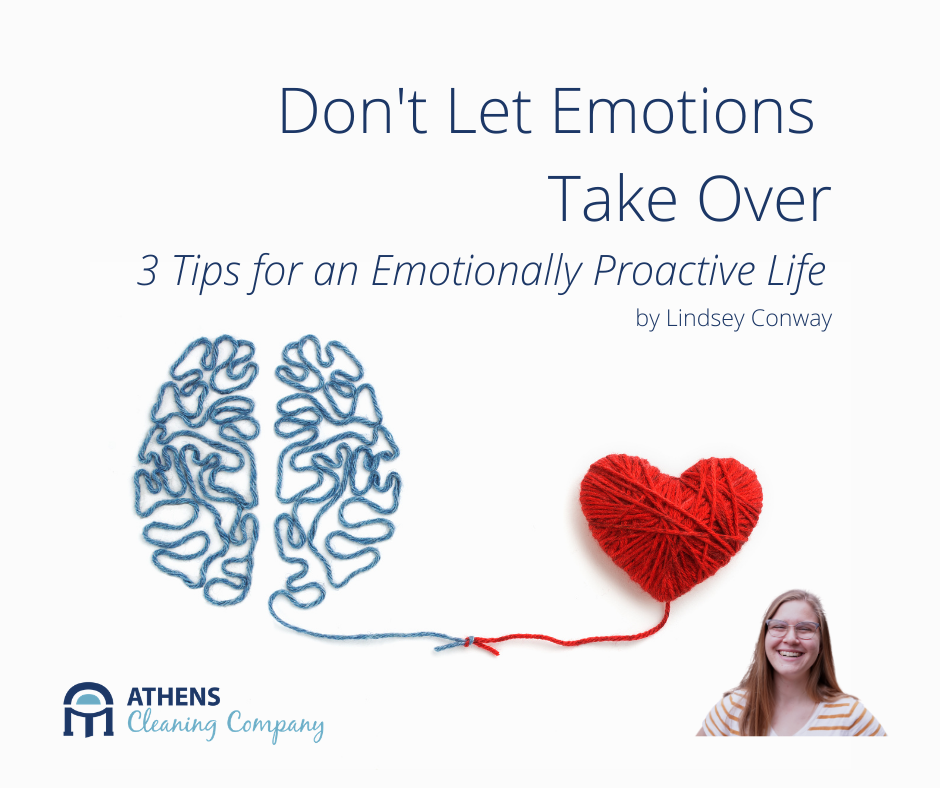
18 Dec Don’t Let Emotions Take Over – Three Tips for a Proactive Emotional Life
There is no one in control of you other than you.
Even when you don’t have the power to control circumstances, you do have control over how you decide to view and respond to them. The most effective people are proactive and choose how to respond to the outside factors in their life.
This idea comes from Steven Covey’s “7 Habits of Highly Effective People.” In the first chapter of his book, he explores the proactive nature of effective people.
Here are three ways to set yourself up to live with a proactive approach and take responsibility for the ways you respond to any given stimulus or situation in your life.
1. Get centered
It’s so easy to wake up and immediately scroll through email, text or social media on your smartphone. Use it as an alarm, and it’s literally the very first thing you interact with at the start of your day.
A study from research group IDC, shows that nearly 80 percent of smartphone users check their devices within the first 15 minutes of waking. When we do this, we shock our brains with waves of high stress, leading to feelings of irritability, worry, fear, anger or even paranoia throughout the day, according to research from EQ Minds.
Rather than spending your first few moments awake reacting to the many stimuli your phone may present you, take at least an hour to get centered instead. Doing so will lead to less feelings of stress and actually set you up to be more efficient, productive and proactive during your day.
Use this hour to prepare yourself to be proactive rather than reactive in your conversations, events and challenges. You might exercise, read, meditate, make a healthy breakfast or connect with loved ones during this time.
2. Set your emotional expectation
A reactive approach to life is instinctual, gut-level. A stimulus affects you and you respond. But with a proactive approach, you take into account your trigger points and prepare your responses ahead of time.
There will be many people throughout your life that will irritate you or situations that just don’t go your way. With a proactive approach, you will choose how to respond to those people and situations rather than reacting to them.
There is a Bible verse that perfectly captures how to focus your attention in order to make proactive rather than reactive decisions:
“Brothers and sisters, whatever is true, whatever is noble, whatever is right, whatever is pure, whatever is lovely, whatever is admirable—if anything is excellent or praiseworthy—think about such things,” Philippians 4:8.
Instead of focusing on the negative, find something noble, pure or admirable about every person or situation you encounter.
For example, you may have a colleague who is a really energetic, boisterous person and gets on your nerves. Rather than focus on the things that annoy you about this person, try to find one or two characteristics, one or two praiseworthy things about this person, and focus on those when you are around them. With this boisterous colleague, it might be that you really appreciate their positivity. By doing this, you are setting your emotional expectation for the situation.
When we craft a different way of viewing our life’s circumstances and challenges, we will inevitably be crafting a different way of experiencing and responding to them as well.
3. Have an attitude of gratitude
Across her 12 years of research on nearly 11,000 pieces of data, researcher and author Brene Brown has found that not one person who described themselves as joyful did not also consistently practice gratitude.
When something negative happens or doesn’t go the way you planned, the first thing you can do to begin taking a proactive approach is to find something to be grateful for in the situation.
There’s always a way to learn from or find the good in every situation. You can be thankful for the challenges in life because the only way to develop the best version of yourself is to go through circumstances that stretch and grow you.
Lean into God in these moments, knowing that He won’t give you something more than what you can handle and will always use these trials to shape you into the incredible person He designed you to be.
Some tangible ways to maintain an attitude of gratitude are keeping a thankfulness journal or sharing what makes you grateful around the table with family before meals. You might also pause at a specific time during the day and remind yourself of the things you are grateful for. Consistently practicing gratitude will help you create a more positive view on all aspects of life and learn to respond in a proactive rather than reactive way.
~ Lindsey Conway, Athens Cleaning Company


